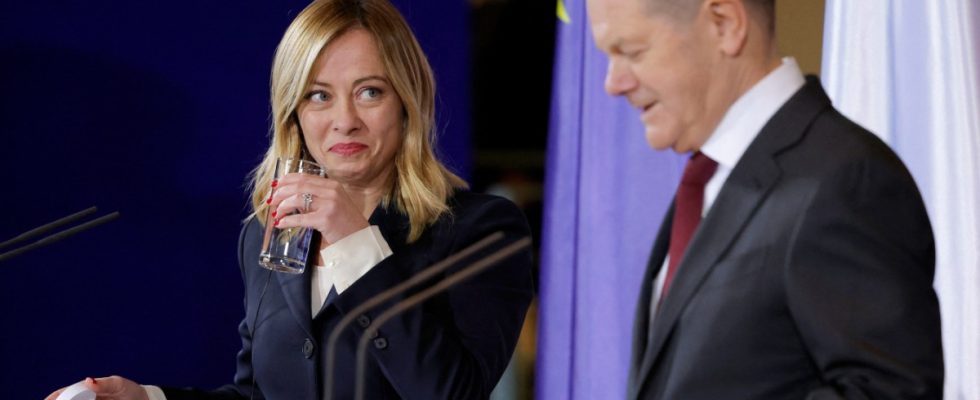Olaf Scholz does not belong to the “Tuscany faction” like his Social Democratic Chancellor predecessor Gerhard Schröder. He recently vacationed in Provence and the Allgäu. However, he and his government cannot be accused of lacking interest in Italy: Scholz had been in office less than two weeks when he visited then Prime Minister Mario Draghi in Rome. The two agreed on regular meetings of their cabinets and a joint action plan. Foreign Minister Annalena Baerbock ensnared her colleague Luigi Di Maio. At Villa Madama they announced at the beginning of 2022 that they wanted to sign the agreement for closer cooperation in the summer – nothing came of it.
Draghi resigned after quarrels in his coalition, which Scholz very much regretted – he saw the convinced European as an important partner. New elections in autumn 2022 brought the post-fascist Georgia Meloni and her Fratelli d’Italia party to power. In Berlin, people first waited to see how the new right-wing government would behave, since Meloni had campaigned against migrants, against the EU, against Germany and Scholz personally during the election campaign.
During a video link between the G-20 countries, they called on Putin to withdraw his troops
She said that Hungary’s Prime Minister Viktor Orbán was not the problem in the EU, it was the “socialist chancellor” from Germany. Such frictions seem to be forgotten. On Wednesday, Meloni traveled to Berlin with seven ministers for government consultations, the first since 2016. She emphasized that it was the third bilateral meeting this year and spoke of a “historic day” that she had spent with Scholz, first over a video link with the heads of state and government of the G-20 countries, which was also attended by Russian President Vladimir Putin for the first time.
Both emphasized that it had been made clear to the Kremlin ruler that he had to withdraw his troops from Ukraine. With a view to the war in the Middle East, Scholz welcomes the announced release of hostages by Hamas and, like Meloni, emphasized that Israel has a right to defend itself within the framework of international law. You can “sign everything” that Scholz said, said Meloni. In the federal government, she is now seen as a pragmatist who stands firmly in the transatlantic alliance and is willing to cooperate constructively in Europe, even on issues on which Rome and Berlin differ.
The bilateral conversation was about such questions, such as the reform of the EU Growth and Stability Pact. When you talk about reducing the mountain of debt, you also have to know how you can make the necessary investments to manage the transformation and remain internationally competitive, said Meloni.
Issues that concern the Chancellor in a completely different way after the Constitutional Court ruling, because the government is now missing 60 billion in the climate transformation fund. Scholz said that the coalition factions wanted to decide quickly on the budget, but he could not anticipate the Bundestag’s decisions.
Both countries have now even come together when it comes to migration policy
At the same time, he was confident about the reform of the EU Stability Pact; There must be clear rules, but no country should be forced into austerity programs. Meloni will be happy to hear that, as she is dealing with more than 140 percent structural debt and a deficit of around four percent.
Even when it comes to migration policy, Germany and Italy finally came together after some toxic arguments and disputes over sea rescue activists’ initiatives, even if the squabble in Brussels delayed negotiations on reforming the common European asylum system. The federal government is now watching with interest the refugee agreement that Meloni concluded with Albania – in any case, negotiations with countries of origin and transit on an equal footing are necessary, emphasized Scholz.
Before the cabinets met for their plenary session at a working lunch in the Chancellery, Meloni was allowed to sign the action plan once initiated by Scholz and Draghi – she spoke of a “new phase of relations” and a “signal to Europe” after Rome temporarily suspended the negotiations had not progressed quickly enough.
Specifically, Italy and Germany want to push forward a pipeline for gas and later hydrogen, the so-called southern corridor, which will connect Germany via Austria and Switzerland with Italy and North Africa and enable the import of ten million tons of hydrogen by 2030. The two governments also want to conclude a gas and solidarity agreement, as Scholz said. The governments also want to work to strengthen small and medium-sized businesses, which form the backbone of the economy in both countries, and to support an ambitious EU trade agenda.
Closer cooperation is also planned for armaments projects. Italy could start developing a new combined system for ground combat that would replace today’s main battle tanks. The project previously operated by Germany and France Main Ground Combat System is delayed due to different ideas among the allies. Italy would like to play on an equal footing with Germany and France – and that would be just right for Berlin. Here too, Italy’s ideas are similar to those of the Germans.

